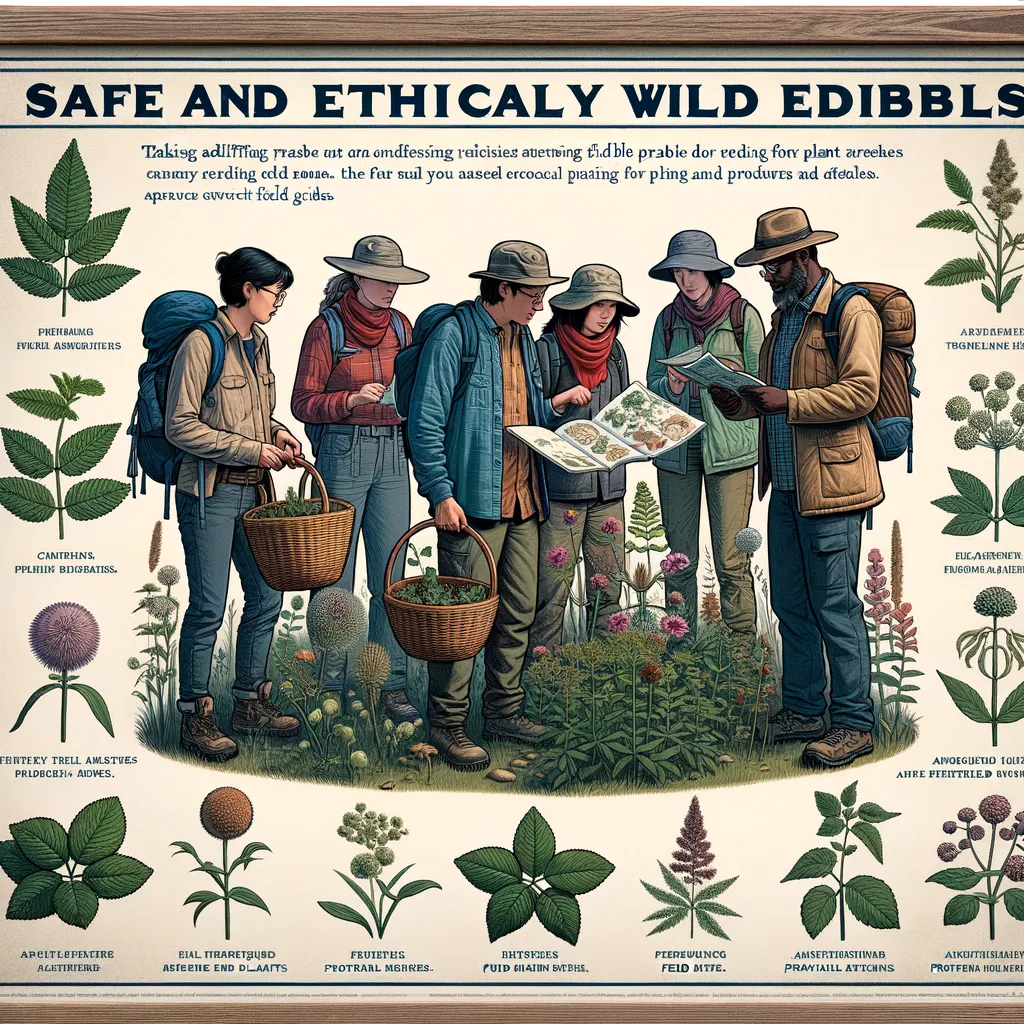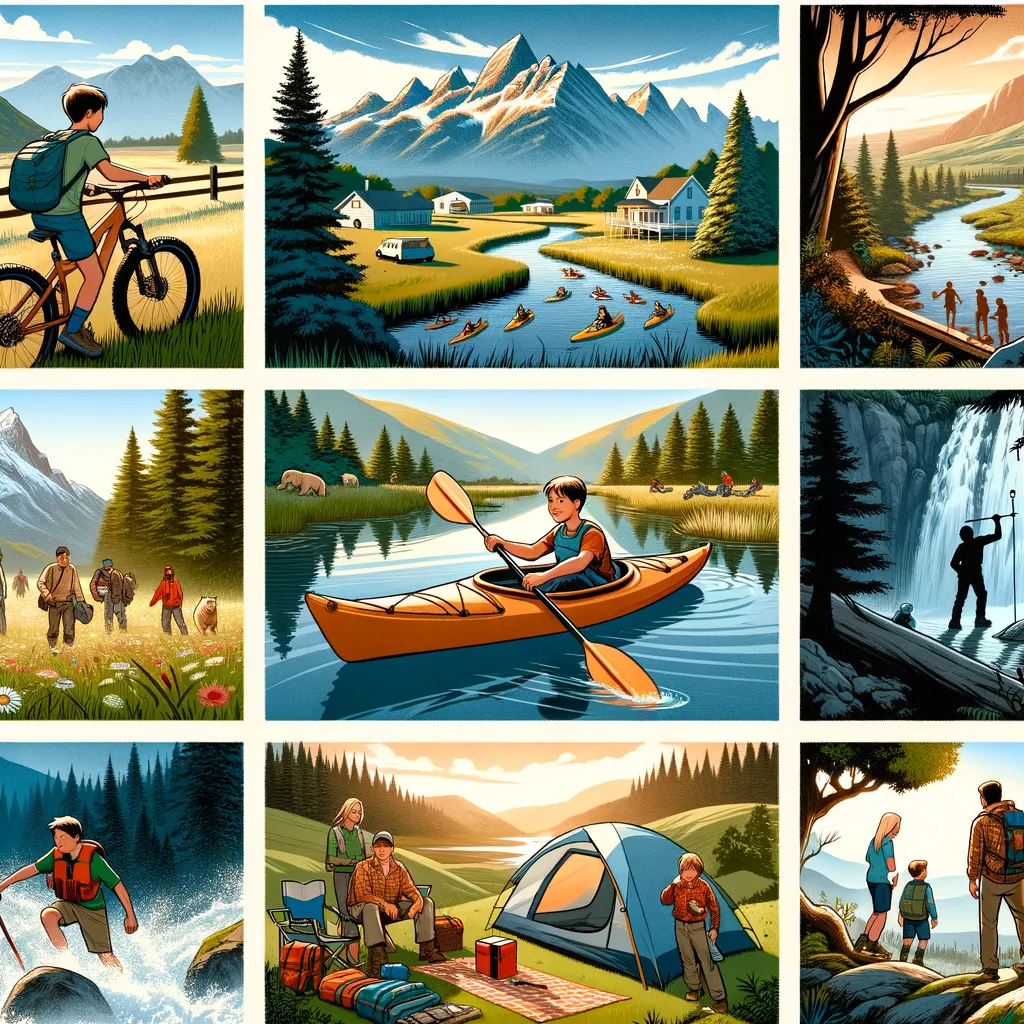Title: Unveiling Nature’s Bounty: Your Essential Guide to Foraging Wild Edibles Safely and Ethically
Introduction to Foraging Wild Edibles
Welcome, adventurous parents! Are you looking for a fun, educational, and utterly delicious way to spend time with your family outdoors? Foraging for wild edibles might just be the perfect activity for you. It’s not only a wonderful opportunity to teach your children about nature and sustainability, but it also comes with the reward of enjoying fresh, healthy foods right from the earth. In this essential guide, we’ll explore how to get started with foraging safely and ethically, ensuring a joyful and enriching experience for you and your little explorers.
The Joy of Foraging with Your Family
Imagine wandering through a lush forest or strolling along a vibrant meadow with your children, basket in hand, on a quest for nature’s treasures. Foraging connects us with our environment and ancestors in a deep, meaningful way. It’s an activity that not only nourishes the body but also the soul. Moreover, it instills in children a profound respect for nature, teaches them about seasonal eating, and encourages curiosity and observation skills. Ready to embark on this wholesome journey? Let’s delve into how you can forage both safely and ethically.
Understanding the Basics of Safe Foraging
Before you set off on your foraging adventure, it’s crucial to arm yourself with knowledge to ensure a safe experience. Here are some foundational tips:
- Identify with Certainty: One of the golden rules of foraging is never to pick and eat something unless you are 100% sure of its identification. Misidentification can lead to unpleasant or even dangerous situations. Invest in a reputable foraging guide or app, and consider taking a local foraging course as a family.
- Start Small: Begin with easily identifiable and commonly known edibles that have no poisonous look-alikes. Herbs like dandelion and plantain are excellent starters.
- Forage Sustainably: Always follow sustainable foraging practices to ensure that ecosystems remain intact and plentiful for future generations. This includes taking only what you need, spreading out your foraging to avoid overharvesting in a single area, and being careful not to damage plants or their habitats.
Navigating the Ethics of Foraging
Foraging ethically is just as important as foraging safely. As stewards of the earth, it’s our responsibility to approach nature with respect and consideration. Here are some guidelines to ensure your foraging practices are conscientious:
- Know the Land: Forage only in areas where it is legally permitted, such as public lands where foraging is allowed. Avoid private property unless you have express permission from the landowner.
- Leave No Trace: Practice the ‘Leave No Trace’ principles while foraging. This means taking only what you need, leaving areas as you found them, and minimizing your impact on the environment.
- Respect Wildlife: Be aware of the wildlife that depends on these plants for food and shelter. Your foraging should not deprive them of their essential resources.
Conclusion and What’s Next
Foraging for wild edibles with your family is an enriching, enjoyable, and enlightening experience that connects you with nature in a profound way. It offers invaluable lessons on sustainability, ecology, and the simple joys of eating what the earth provides. Armed with the knowledge of how to forage safely and ethically, you’re well on your way to becoming a responsible forager. Stay tuned, as in the next section of this guide, we will dive deeper into identifying specific edible plants, understanding their habitats, and sharing delicious recipes to turn your wild harvest into scrumptious meals your family will love.
Preparing for your foraging adventure is an exciting journey, filled with learning and discovery. Remember, the key to a successful forage is respect – for nature, for others, and for the boundaries of your own knowledge. By following these guidelines, you’re setting the stage for a wonderful experience that will enrich your family’s connection to the natural world and each other. Let’s take this next step together with enthusiasm and mindfulness, ready to embrace the bounty that nature has to offer.

Unveiling Nature’s Bounty: Your Essential Guide to Foraging Wild Edibles Safely and Ethically
5 Things Every Parent Should Know Before Embarking on a Foraging Adventure
Embarking on a foraging journey with your family is not just about stepping into the wilderness and picking the first thing you see. It is a blend of excitement, respect for nature, and an educational experience for both parents and children. To ensure your foraging adventure is both successful and enjoyable, here are five essential tips every parent should keep in mind:
1. Research is Your Best Tool
Before stepping out, spend some time researching the local flora in your area. Knowing what grows in your region and when is crucial to a fruitful foraging experience. Many wild edibles have specific seasons, and familiarizing yourself with these can greatly enhance your chances of finding them. Additionally, understanding the local wildlife and their habitats can help avoid disturbing the ecosystem.
2. Safety Comes First
The importance of being able to accurately identify wild edibles cannot be overstated. Mistaking a toxic plant for an edible one can have serious consequences. Equip yourself and your family with high-quality, detailed guides or apps on wild plants, and consider investing in a local foraging workshop or guided tour. This not only enhances your knowledge but also ensures that your foraging practices are safe and informed.
3. Dress Appropriately for the Adventure
Foraging is an outdoor activity that often takes you through varied terrains, from dense forests to open fields. Dressing appropriately is essential for comfort and protection. Ensure you and your children wear long pants and sleeves to protect against scratches, insect bites, and sunburn. Sturdy, closed-toe shoes are a must to navigate the unpredictable grounds safely.
4. Pack Essential Foraging Tools
A successful forage isn’t just about what you find; it’s also about how you collect and transport your findings. A few essential tools include a durable basket or reusable bags for your haul, a pair of gloves for handling prickly plants, and a small trowel or knife for carefully harvesting roots or mushrooms. Remember, the goal is to disturb the plant and its surroundings as little as possible.
5. Instill Respect for Nature and its Limits
Foraging offers a unique opportunity to teach children about the respect and appreciation we owe to nature. Emphasize the importance of sustainable harvesting – taking only what you need and leaving enough behind for the wildlife and future foragers. Teach them to recognize and respect private property, and always ensure you have the correct permissions to forage in your chosen location.
A Final Thought on Foraging with Family
Foraging for wild edibles opens up a world of exploration, learning, and connection with nature that is unmatched by any other activity. It offers the chance to impart important life lessons on sustainability, environmental stewardship, and the importance of being present. By approaching foraging with preparation, respect, and a sense of adventure, you’re not just collecting wild foods; you’re harvesting memories that will nourish your family’s bond for years to come. So, grab your guidebooks, your baskets, and your sense of curiosity, and step into the world of foraging – where every leaf, berry, and mushroom tells a story of resilience, growth, and the interdependence of all living things.
Remember, the journey into foraging is not just about the harvest; it’s about the shared experiences, the lessons learned, and the joys of discovering nature’s bounty together as a family. Embrace this journey with an open heart, and let the multifaceted world of wild edibles enrich your family’s outdoor adventures and palates. With each foraging trip, you’ll find that nature has a way of offering surprises and delights, teaching us new lessons and deepening our connection to the living world.
Find more tips on the Outoors. Find camping spots
Disclaimer
The articles available via our website provide general information only and we strongly urge readers to exercise caution and conduct their own thorough research and fact-checking. The information presented should not be taken as absolute truth, and, to the maximum extent permitted by law, we will not be held liable for any inaccuracies or errors in the content. It is essential for individuals to independently verify and validate the information before making any decisions or taking any actions based on the articles.



